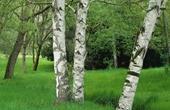Bareza

Used parts
Leaves, bark, juice. Pharmacy name: birch leaves - Betulae folium( formerly: Folia Betulae), birch tar - Betulae pix( formerly: Fix Betulina), birch juice - Betulae liquor( formerly: Liquor Betulae).
Botanical description of
I will save the description of birches( their homeland - Europe), giving here only the differences between them. Birch drooping, or warty, larger than birch fluffy and, as a rule, prefers dry places. Her branches hang down and at a young age are strewn with warty glands forming resin. The leaves are also larger. At a birch fluffy, on the contrary, young branches are pubescent, and it grows in damp woods and on bogs. In medicine, both kinds are used.
Collecting and billet
Young leaves are harvested in May-June and dried outdoors. Birch sap is extracted when it rises, early in the spring, pruning the bark and collecting the leaky juice into a tin collector. Another method is to drill holes in the trunk with a depth of 1 to 5 cm, into which tubes or grooves are immediately inserted, and the juice flows down them into suspended collections. From each hole juice flows about 10 days, with one day flowing from 1 to 5 liters, depending on weather and temperature. The tar is extracted by the so-called dry distillation of the bark of a tree. Birch bark is the most important raw material for obtaining tar;it is removed from trunks and old boughs, and then dried.
Active substances
As active substances in the leaves there are flavonoids, they are supplemented by numerous other substances( essential oil, bitterness, tannins, saponins, vitamin C, etc.).Birch juice contains invert sugar, organic acids, proteins and growth substances. The birch bark is rich in betulin( birch camphor), contains phytosterol, tannins, bitterness, essential oil, resins and other organic substances. In the tar, phenols( guaiacol, cresol, etc.) were found.
Healing and application
Birch leaf tea is the best way to remove water from the body. It does not irritate the kidneys, but it increases the formation of urine. Therefore, it is used to wash the urinary tract, with bacterial inflammatory diseases associated with spasms, and generally prescribed in kidney disease as specialists - urologists, and general practitioners. The German State Health Service recommends the use of birch leaves to enhance urine output in urolithiasis and other diseases characterized by water retention( edema).Usually it happens with heart diseases and kidney failure. Whether a large amount of tea from birch leaves contributes to the liberation of salts( especially the uronic acid salt) - in this respect, the researchers have different judgments. However, the prevailing opinion is that the treatment of tea from birch leaves reduces the level of uric acid in the body.- Tea from birch leaves: 2 teaspoons with top of birch leaves pour 1/4 l of boiling water and insist 10 minutes. You must drink tea warm. The correct dose is three cups a day.
